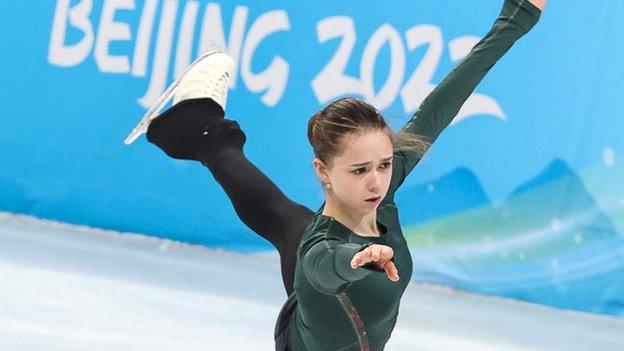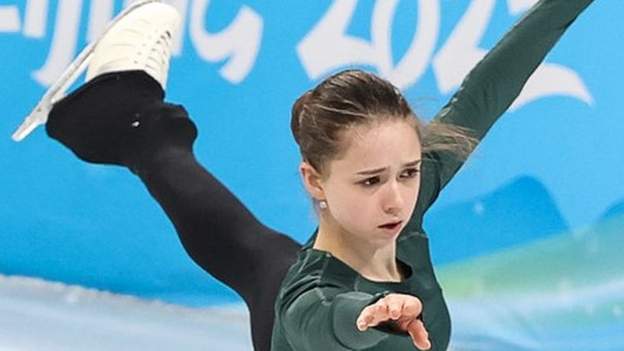Valieva failed drug test confirmed

Teenage Russian figure skater, Kamila Valieva, failed a drugs test in December, the International Testing Agency (ITA) has confirmed.
The 15-year-old helped win team figure skating gold for the Russian Olympic Committee on Monday but the medals were not awarded because of a “legal issue”.
The Russian Anti Doping Agency (Rusada) lifted her suspension, enabling her to continue at the Beijing Games.
The International Olympic Committee has now appealed against that decision.
As has the International Skating Union, calling on the Court of Arbitration for Sport (Cas) to reinstate Valieva’s provisional suspension.
The ITA said Valieva – who was the first female skater to land a quadruple jump in competition – had a sample collected on Christmas Day at the Russian Figure Skating Championships in St Petersburg.
It was sent to the World Anti Doping Agency (Wada)-accredited laboratory in Stockholm, Sweden.
The result was only reported on 8 February, the day after she won team gold but before the medal ceremony had taken place.
Valieva tested positive for trimetazidine, which is used in the prevention of angina attacks, but is on the Wada banned list because it is classed as a cardiac metabolic modulator and has been proven to improve physical efficiency.
She was provisionally suspended but challenged the decision and Rusada agreed to lift it on 9 February.
Cas will now hear the case before her scheduled appearance in the individual event, which starts on Tuesday, 15 February.
Valieva, who is favourite for the women’s singles, has been seen training at the Capital Indoor Stadium in Beijing.
IOC spokesman Mark Adams said he wanted a resolution “as quickly as possible”, adding the medals for the team event will not be awarded until the outcome of the Cas hearing.
The United States finished second, Japan were third and Canada were fourth.
The ITA added the “reasoned decision, including the grounds for which the provisional suspension was lifted, will be issued shortly to all concerned parties”.
Eric Myles, chief sport officer of the Canadian Olympic Committee said: “We have the same questions as everyone else about the team figure skating case.
“It’s important that a fair process unfolds and the integrity of sport is protected. Our hope is that this is resolved quickly and the medallists get the medal moment they’ve earned here in Beijing.”
Russian athletes are competing under the name of the Russian Olympic Committee (ROC) because Russia received a two-year ban from Wada in 2019 for its state-sponsored doping programme.
Between 17 December 2020 and 17 December 2022 no athlete can represent Russia at the Olympics, Paralympics or World Championships.
The ban was originally for four years but was reduced to two by Cas.
Analysis
BBC senior sports news reporter Laura Scott, in Beijing
At the heart of this is a 15-year-old athlete. There are concerns over her welfare and the potential involvement of others in this.
But viewers would be forgiven for feeling a sense of depressing deja vu that once again we are at an Olympics, there is a doping controversy and it involves Russia.
For all the latest world News Click Here

